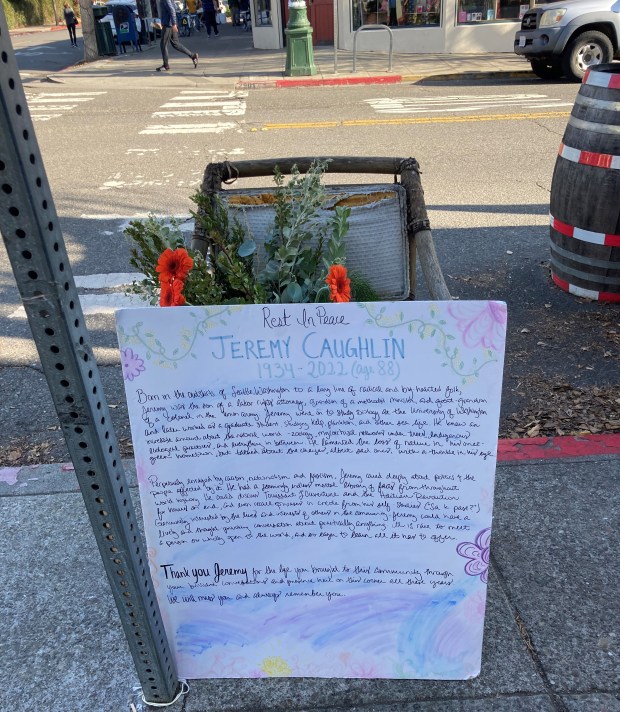How do you measure a life? For Jeremy Caughlin, it was the people he met and the conversations he had sitting in a chair every day on the corner of College Avenue and Russell Street in Berkeley’s Elmwood district, right in front of the Baker & Commons café, engaging everyone who stopped to talk with him in spirited conversations. There was a cup at his feet for donations, but he was not a panhandler. He was there for the social interaction, not just the money he needed to live on.

“He could talk about anything,” says Kara Hammond, the owner of Baker & Commons. “He had a wealth of knowledge and read a lot on his cell phone while he was there. He was a very intellectual guy who knew a lot about history, current events and other cultures.
“He saw it as his job, but some days he had an appointment that morning and would show up a little later. When that happened, he was like, ‘Huh, I’m really late to work today,’ but he’d compensate by staying later that afternoon, even after we closed at 6:30. He and I had an interesting relationship. He had his business, and I had mine, and we’d compare notes on the foot traffic: ‘How was your day? ‘Oh, kind of slow today. Not too many people out.’ ”
In the process, he became beloved. For many people, it wasn’t a visit to the Elmwood unless you had a chat with Jeremy. But the sentiment wasn’t universal.
“Some people would complain about him, usually folks from out of town,” says Hammond. “They were appalled. They couldn’t understand why he was there. Some even questioned whether he was legit. But the people in the neighborhood were never bothered by him. He was always nice, always talkative but also kind of quiet. He didn’t intrude himself on you, but he was always there, part of our community.”
Jeremy passed away Dec. 2 at the age of 88. The next day, one of the neighbors named Sadie Radinsky posted a sign on the corner reading, “Rest in Peace, Jeremy Caughlin. Born in the outskirts of Seattle, Washington, to a long line of radical and big-hearted folks, Jeremy was the son of a labor rights attorney, grandson of a Methodist minister and great-grandson of a colonel in the Union Army.
“Jeremy went on to study biology at the University of Washington and later studied kelp, plankton and other sea life in graduate school. He knew an incredible amount about the natural world. He lamented the loss of nature in his once-green hometown but talked about the changes, albeit sad ones, with a twinkle in his eye.
“He had a seemingly endless mental library of facts from world history. He could discuss Toussaint L’Ouverture and the Haitian Revolution for hours on end and even recall phrases in Creole. He was genuinely interested in the lives and interests of other people in the community. It is rare to meet a person so wholly open to the world and so eager to learn all it had to offer.”
The day after that, someone else placed a chair next to the sign on Jeremy’s corner. And the day after that, another person placed a vase of flowers on the chair. And there they remain, almost a month later. It’s hard to let a good man go.
“Thank you, Jeremy, for the life you brought to this community through your brilliant conversation and genuine heart on this corner all these years,” Radinsky also wrote on the sign. “We will miss you and always remember you.”
Amen.
Martin Snapp can be reached at catman442@comcast.net.





Join the Conversation
We invite you to use our commenting platform to engage in insightful conversations about issues in our community. We reserve the right at all times to remove any information or materials that are unlawful, threatening, abusive, libelous, defamatory, obscene, vulgar, pornographic, profane, indecent or otherwise objectionable to us, and to disclose any information necessary to satisfy the law, regulation, or government request. We might permanently block any user who abuses these conditions.